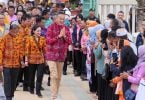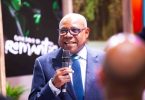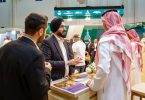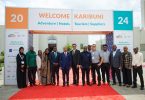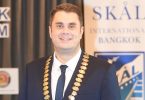LONDON (eTN) – He’s being hailed by some as the Obama of South Asia. The man in question is Mohamed Nasheed the new president of the Maldives. Both he and the American president face the same challenge: they’re strong on rhetoric but now have to fulfill unrealistically high expectations. Mohamed Nasheed was well aware of the huge task ahead when he spoke at the Royal Commonwealth Society during his recent visit to London. He recalled the twenty-year struggle for democracy.
“It was dangerous for us to speak or write about things – some of us were jailed and tortured for talking about our ideals. Many Maldivians thought we were simply wasting our time. We were stubborn, we continued doing our work, doing what we thought would be the right thing, hoping there would be a tsunami effect that would change things. Eventually, the tsunami did prove to be the catalyst for change.”
Having taken refuge in Sri Lanka and the UK to avoid persecution by the government of the autocratic former president, Maumoon Gayoom, Mr. Nasheed and his loyal band of supporters returned to the Maldives once conditions had improved sufficiently to allow the formation of political parties.
“We managed to galvanize the Maldivian people into political activism and succeeded in bringing about a smooth transition of power. Democracy in the Maldives is very tender, we have to deliver on promises we were making. We were telling people ‘you are having a hard time because of the previous government.’ We are facing a difficult, challenging time because of the international economic conditions and because we inherited empty coffers.”
President Nasheed emphasized that in order to move forward, his government would have to come to terms with the past. His party’s election victory in October 2008 marked the end of the longest rule by a leader in Asia and also one of the world’s most repressive governments. During his three decades in power, Mr. Gayoom, brutally suppressed any signs of opposition and dissent. International human rights groups compiled a catalogue of opponents thrown into jail and in many cases tortured.
Mr. Gayoom has consistently denied this by pointing to moves since 2004 to introduce democratic reforms. His opponents maintain he was driven down the path of reform by growing unrest and protests in the country and international pressure. Mr. Nasheed, was himself jailed and sent into exile to remote Maldivian islands for a total of nearly six years.
Since coming to power, Mohamed Nasheed has insisted that he intends to make a fresh start without seeking vengeance against his predecessor but he admits it’s been hard to get many Maldivians to share his sense of magnanimity. Mr. Gayoom has not made things easier by refusing to disappear into comfortable exile and has made no secret of his hopes for a political comeback. President Nasheed explained the dilemma he faces in deciding what to do about Mr. Gayoom and his supporters, “We can marginalize them by going forward but so many people are confronting me saying they want justice. We have to find some way to process the past so that people can say ‘this happened to me’ because I know if I examined my past I can be very vindictive if I touch that. We might be able to come to terms with the past by having a brighter future.”
In his speech, President Nasheed addressed the need to build up the judiciary and train judges in order to create an effective and independent system. Scarred by abuses under Mr. Gayoom’s rule, President Nasheed stressed that the government should not touch the judiciary or influence it in any way.
President Nasheed also listed other problems in the Maldives: drug addiction among the youth, overcrowding in the capital, Male, and the urgent need to upgrade essential services such as education and health.
“We hope to address these issues and need imagination, strength and courage to deal with this. We will hope to have a smooth consolidation of democracy in the Maldives. We want to create a blueprint on how to change dictatorship in the Maldives. We have to set a precedent for other countries and show by example that you don’t have to bomb countries to bring about change. We’ve had transitions before when the outgoing leader has been mobbed or killed. This takes the country back many years. We have to find another way to build a better country.”
The Maldives is a Muslim country with a constitution that stipulates that you have to be a Muslim to be a citizen. President Nasheed said this clause was passed by the previous government and conceded that he would not be able to promise change in a short period of time. He acknowledged that there was a strong radical Islamist element in the Maldives.
“Radical Islam used to be the only opposition – we created space. Once we started, the rise of Islamist radicalism in Maldives was checked. In my mind, democracy is very important to address Islamic radicalism. We didn’t have an alliance with Islamic parties, though we met them 26 times. They lost very badly in the election. The mainstream in the Maldives is very progressive and liberal.”
On the positive side, despite the political change, tourism remains the biggest source of revenue for the Maldives. Mr. Gayoom’s supporters credit him with turning the country into a tourist paradise and bringing in huge amounts of foreign revenue. But this income has not been spread among the population of more than 300,000.
The Nasheed government has pledged to ensure that there is a more equitable distribution of the income generated by tourism. The president, when asked about eco-tourism, said while this as an area his government intends to develop, tourists attracted to the Maldives were primarily looking for a good time.
“We banned shark fishing though I don’t think this will save us. You can’t make money by looking at sharks. Eco-tourism doesn’t bring the same returns as luxury tourism. The society here and in the world needs to change and it’s only through changing this mindset that you can make substantial change.”
The Maldives is also the country that faces the biggest threat from climate change and a rise in sea levels. The highest point on any of the 1,200 islands is just 2.4 meters above sea level. President Nasheed said climate change threatened the very existence of the Maldives and underlined his government’s commitment to making the country carbon neutral in ten years.
“We want the Maldives to be a showcase for new technology. We believe renewable energy is feasible. We need to find investors to come to our country and they must use renewable energy.”
With the Maldives set to become chair of the South Asian Association for Regional Cooperation (SAARC) the President noted that although small his country was strategically important especially for India and Sri Lanka. He said both these countries had been generous in providing financial and other support.
On the media, President Nasheed said his government wanted a totally free media and sought to relinquish control of TV and radio services and newspapers. The President said he was seeking investors for a deregulated media sector that would ensure press freedom and competition. “We want to privatize radio and TV Maldives and distribution networks. I have come here to see whether investors in the UK are interested.”
Although the new government’s intentions are generally appreciated there have been misgivings about the speed and the manner in which many of the changes are being introduced. A Maldivian professional who had originally welcomed the new government is now having serious doubts.
“The current government has no concrete policies, just their manifesto. They do not believe in population consolidation or sustainable developments. They have also created numerous political posts and appointed useless, unqualified people to various positions and they do things in an ad hoc manner. There isn’t even the minimum consultation that used to be there before. They do not trust the civil services and basically it’s a bunch of activists running everything. It’s really disheartening, this is not necessarily the change we wanted.”
There’s also criticism of the government’s enthusiasm for apparent unfettered privatization with the message that the “Maldives is open for business.” Many Maldivians are worried about selling the country’s limited resources to foreigners and the dangers of handing over control of almost all services, education included, to foreign ownership. Fears are growing that despite government assurances, its policies could end up with the rich becoming richer and the rest of the Maldivians being consigned to relying on welfare.
As Mohamed Nasheed recognized winning the battle for democracy may now prove to be the easy part; consolidating this hard-fought victory and convincing the people of the Maldives that the pain of the past thirty years was worthwhile, could turn out to be an even tougher struggle.
Rita Payne is the current chair Commonwealth Journalists Association (UK) and a former Asia editor for the British Broadcasting Corporation.






